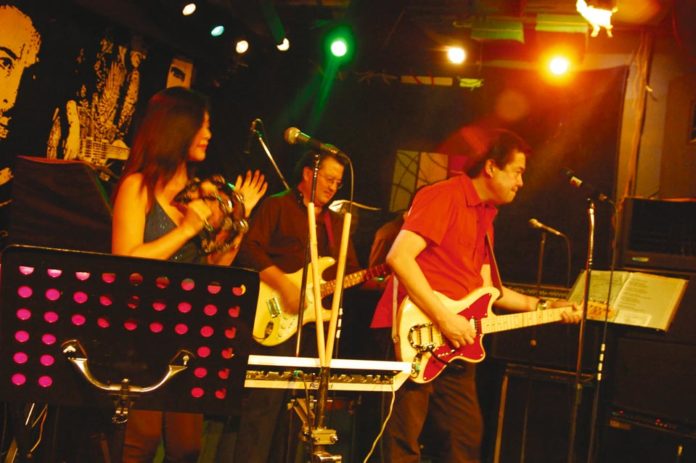“WHEN rock came in, people didn’t know what to do. Music was changing, and it’s changing now,” the late guitarist and legendary guitar-maker Les Paul once said. For the man who brought his own version of Les Paul guitars in the Philippines, it appears to ring true.
Ramon Jacinto, or RJ as he is commonly known, started early in the entertainment industry. As a 15-year-old boy, he set up his first business venture “RJ Enterprises,” which had a studio. It was not long after that he made his band “RJ and the Riots.”
When RJ was 17 years old, he founded his first radio station named DZRJ, which played hits from the growing rock sensations of the 1960s like the Beatles and the Ventures.
“My first radio station wasn’t powerful, but it was a real radio station. It was manned by classmates at the backyard of my house,” RJ told the Varsitarian.
It was in that radio station where he played the beginnings of rock ‘n roll in the Philippines, and eventually became Radyo Bandido or bandit radio.
Currently, RJ owns the Rajah Broadcasting Corporation, which holds one TV and 11 radio stations. His TV station, RJTV, recently tied up with another prominent channel, Entertainment Central (ETC) Second Avenue to alternately broadcast shows from both channels.
Radyo Bandido continues to broadcast as DZRJ-AM, airing news and radio commentaries. His more famous DZRJ-FM station plays a different blend of music that caters to people of every age.
“(DZRJ-FM is) the only radio station that plays five decades of the greatest hits and we’re able to combine it in a formula of three-in-a-row,” RJ said.
Guitar hero
With guitars designed like the famous Gibson Les Paul and the renowned Fender Stratocaster, RJ’s line of guitars spans from the cheapest commercially-made guitar to the most expensive kind.
“We make all kinds of guitars. We have the Taylor Acoustics, top of the line acoustic guitars, and we also have the cheapest, the Gitarang Tipid,” he said.
It was also through this guitar that he was able to provide jobs for skilled craftsmen in Guagua, Pampanga.
“We give them jobs by ordering from them. Then, we supervise the guitar makers. But we might license other makers because they cannot fulfill the big demand. We may be giving out 500 more jobs,” RJ said.
Such jobs lead to cheaper, but well-sounding replica guitars of top brands like Gibson. Also included in his roster of guitars are those made under the supervision of legendary luthier (guitar maker or repairman) Rudy Discipulo. RJ’s Series One Roadtone has a crisp sound that compares to a Gibson Les Paul.
RJ uses his signature and customized guitars, which belong to the Les Paul line, for his performances.
“I go on air during Fridays when I play at the bar, and on Sundays,” he said.
In the same light that DZRJ-FM plays five decades of the greatest hits, he personally plays in the RJ Bistro in Makati. He often plays the hits of his time, like 50s and 60s hits.
“My influences are Elvis Presley, the Beach Boys, Eric Clapton, the Ventures and the Shadows,” he said. But RJ also mentioned that he rolls out with younger musicians and singers.
“Every month we have this big concert at the Mandarin Hotel and I invite guests like Sitti Navarro, Christian Bautista and Nyoy Volante,” he said.
On Sundays, he runs a mini-teleradyo program, which is simultaneously broadcasted on television and on radio.
Fighting from afar
RJ took his undergraduate degree from Ateneo de Manila University and immediately after graduating from Ateneo, he helped manage the Iligan Steel Mill. He was senior vice-president of the business, with around 2500 workers reporting under him. While working, he took up law in UST’s Faculty of Civil Law so he could bolster his knowledge about business law and to hopefully become a lawyer.
“In law school, I studied civil contracts and the pitfalls into entering an agreement,” RJ said.
In 1972, former president Ferdinand Marcos declared martial law and things started to become awry for RJ and his family. His family’s steel mills were sequestered by Marcos. His band was rendered inactive. And his law school hindered.
“I was only able to finish three years in law school. Little did we know that he was going to declare martial law, while we were out of the country because we were celebrating my father’s birthday in Rome,” RJ said.
RJ then moved to the United States for 14 years, working with anti-martial law and anti-Marcos Filipinos in the early part of the 1980s.
“We had to stay out of the country. Abroad, I became close to Ninoy Aquino and (actively participated in) the campaign against martial law,” he said.
His campaign with Ninoy composed of going around the US campaigning under the banner of the Movement for Free Philippines.
In February 1986, when the Catholic Radio Station Radyo Veritas was bombed, Radyo Bandido continued broadcasting anti-Marcos messages until Marcos’s fall in 1986. Right after the EDSA People Power Revolution, he returned to the Philippines and got back some of their assets.
“When I got back here [Philippines], the radio stations were returned to me, except Iligan Integrated Steel Mills, now named National Steel,” RJ said.
Currently, he resides in Makati, along with his wife Frannie. They have six children.
Despite the hardships he has experienced, he still maintains a jolly attitude and keeps in touch with his inner spirit as a musician and grip the changing currents and trends of music.
“Rock ‘n roll is a way of life, it’s not just music. You want to change things,” RJ said.











